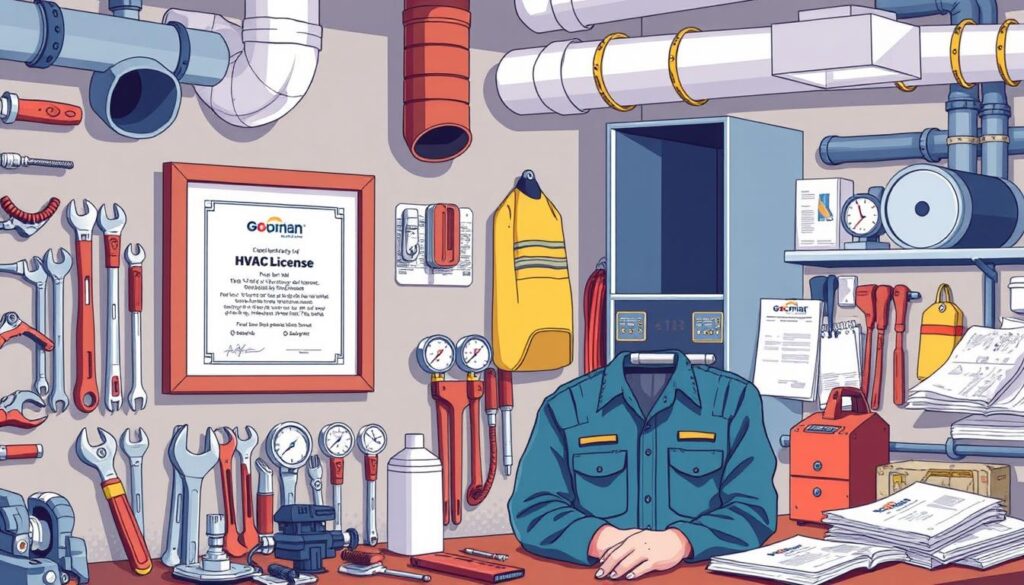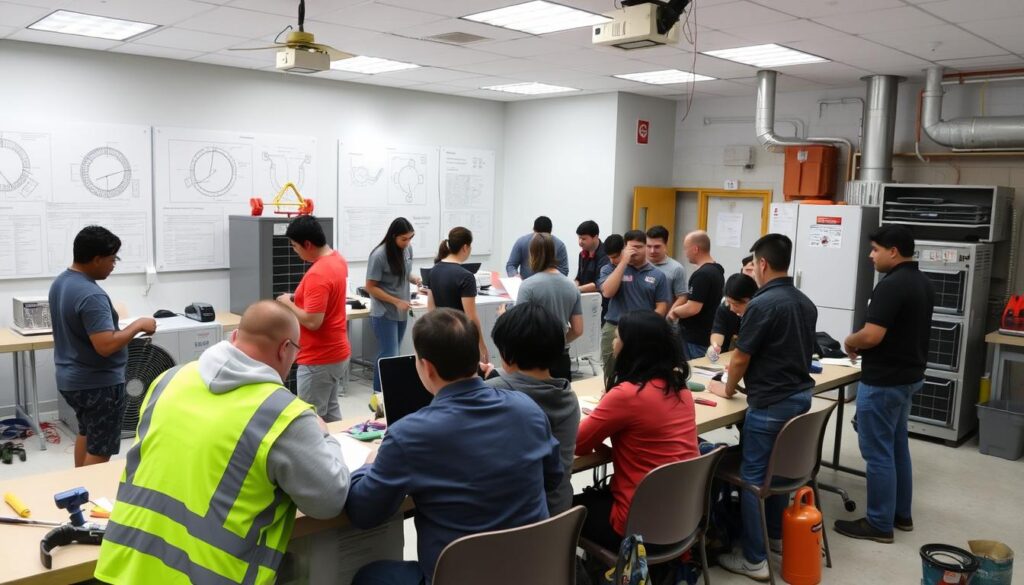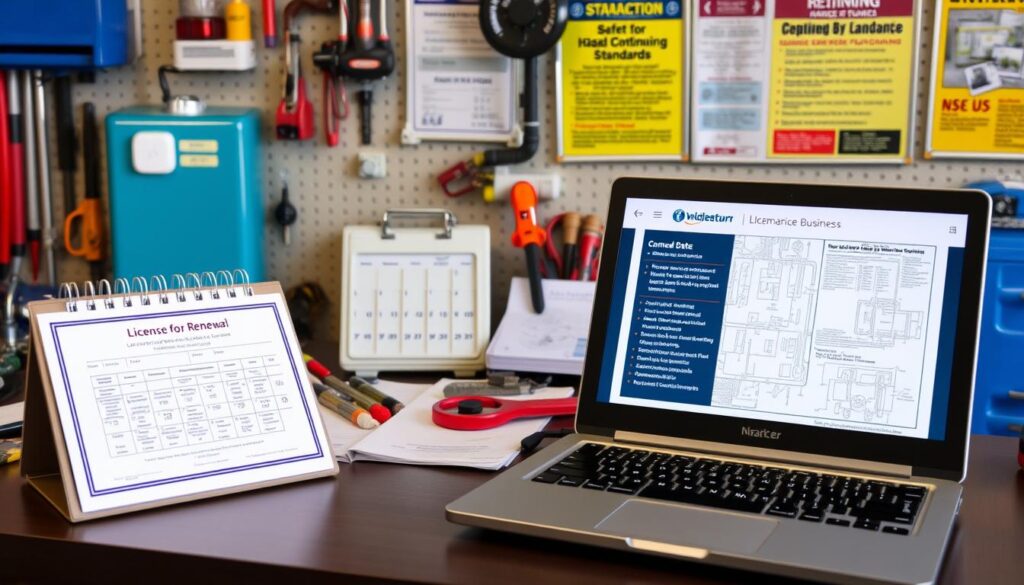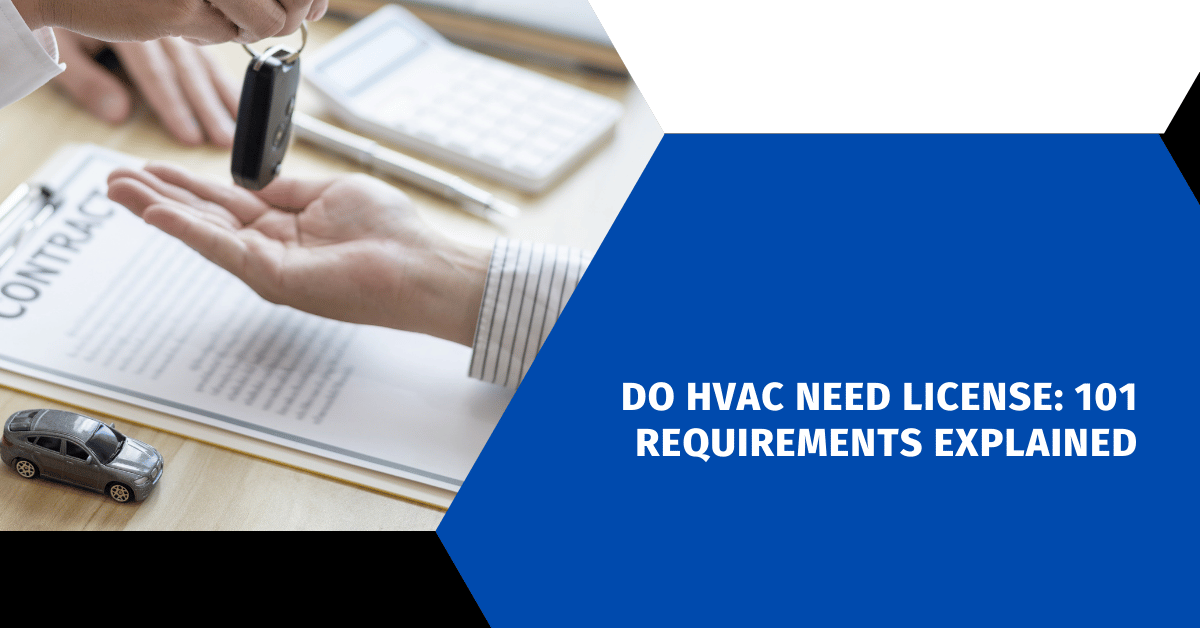Affiliate Disclosure
HVAC Guide Guys is a participant in the Amazon Services LLC Associates Program, an affiliate advertising program designed to provide a means for sites to earn advertising fees by advertising and linking to Amazon.
Do HVAC Need License? Over 415,800 Heating, Air Conditioning, and Refrigeration Mechanics and Installers work in the United States. New York has 22,700 of them. As the HVAC industry grows, knowing the licensing rules is key.
Licensing rules for HVAC vary across the country. Some states have statewide rules, while others let local areas handle it. It’s important to know the rules in your area. This keeps everyone safe and lets you run your business legally.

Key Takeaways
- HVAC licensing requirements vary by state and local jurisdiction.
- Some states require statewide licensing, while others delegate licensing to local authorities.
- HVAC technicians may need different types of certifications depending on the scope of work.
- Licensing ensures technicians meet industry standards, adhere to safety protocols, and possess the necessary skills.
- Understanding the specific licensing requirements in your area is crucial for HVAC professionals.
Table of Contents
Understanding HVAC Licensing Fundamentals
In the HVAC world, licensing rules change a lot from state to state and even within cities. HVAC pros must deal with a lot of hvac licensing laws and hvac regulations. This is to make sure they work legally and safely where they are.
State vs. Local Licensing Requirements
Some states have one set of hvac contractor requirements for everyone. But others let cities or counties decide their own rules. So, what an HVAC contractor needs to do can change just by where they are, even in the same state.
The Legal Framework for HVAC Contractors
The rules for HVAC contractors usually cover education, experience, tests, and insurance. These rules help make sure HVAC pros know their stuff and can do their job right.
Types of HVAC Work Requiring Licenses
It’s also key to know what kind of HVAC work needs a license. In some places, you might need one license for homes, another for businesses, or even a special one for refrigeration. Knowing this helps HVAC pros follow the law.
By getting the basics of hvac licensing laws, hvac regulations, and hvac contractor requirements, HVAC pros can handle the complex rules. They can make sure they’re doing things right in their area.
“Operating without a license in California can result in jail terms of up to six months and fines upwards of $15,000, according to the Contractors State License Board of California.”
| HVAC License Type | Average Annual Salary |
|---|---|
| HVAC Engineer | $77,036 |
| HVAC Installer | $64,306 |
| HVAC Technician | $64,306 |
| HVAC Supervisor | $83,903 |
Explore Our HVAC Shop
Looking for top-rated HVAC tools, parts, and accessories? Visit our shop and find the perfect solution for your needs.
Visit the ShopDo HVAC Need License: State-by-State Requirements
HVAC licensing rules change a lot from state to state in the U.S. It’s key for HVAC pros to know the laws in their area. This ensures they work legally and safely. Let’s explore the HVAC licensing rules for each state:
State HVAC License Requirements:
- Pennsylvania doesn’t need state HVAC licenses but requires local ones for contractors.
- Alabama needs a license from the Alabama Board of Heating, Air Conditioning and Refrigeration Contractors.
- Alaska has different HVAC contractor categories under the Mechanical Administrator license.
- Colorado doesn’t need state HVAC licenses, but local areas might have their own rules.
HVAC pros must check the state hvac license requirements and hvac licensing by state in their area. Not following these rules can lead to legal trouble, disputes, and lawsuits.
The U.S. Bureau of Labor Statistics says the HVAC industry will grow 4% by 2029. This shows why knowing hvac license reciprocity across states is key. By getting the right licenses, HVAC contractors can grow their business legally and safely.
“Getting an HVAC license can cost from a few hundred to a few thousand dollars depending on the state or granting organization.”
In short, HVAC licensing rules differ a lot by state. It’s vital for pros to know and follow the local laws to work legally and safely. By understanding these rules, HVAC contractors can thrive in this expanding field.
Types of HVAC Licenses and Certifications
Getting the right licenses and certifications is key for HVAC pros. These show you know your stuff and let you work legally. Let’s look at the main HVAC licenses and certifications needed.
Home Improvement Contractor Certification
To get certified as a home improvement contractor, you need to:
- Be at least 18 years old
- Have two years of HVAC work experience
- Finish an approved HVAC training program
Grade B Refrigeration Engineer Certification
The Grade B Refrigeration Engineer Certification is for those in HVAC who work with refrigeration. To get it, you must:
- Have 2,000 hours of refrigeration work experience
- Complete 100 hours of refrigeration training
HVAC Contractor Certification
To be a certified HVAC contractor, you need to:
- Have a high school diploma or equivalent
- Have four years of HVAC work experience
- Pass the International Code Council (ICC) Certification exam
Remember, the rules for HVAC licenses and certifications vary by state and area. It’s crucial to check the laws in your place to make sure you meet all the requirements.
“Licenses and certifications show an HVAC business is run by real pros who care about their work.”
Explore Our HVAC Shop
Looking for top-rated HVAC tools, parts, and accessories? Visit our shop and find the perfect solution for your needs.
Visit the ShopEducational Requirements and Training Programs
To work in HVAC, you need to meet certain educational standards. This usually means finishing an accredited HVAC training program or an apprenticeship. These programs teach you about electricity, gas piping, air conditioning, and designing HVAC systems.
Some top HVAC schools in the U.S. are Berks Career & Technology Center, Bucks County Technical High School, and York County School of Technology. The cost of these hvac training programs can go up to $10,000. You can choose from classroom or online learning. Many programs also offer financial aid to help students.
Some states require HVAC workers to get special licenses and certifications. This includes the EPA Section 608 certification for refrigerants and state HVAC contractor licenses. The hvac schools and training programs help students pass these exams and meet state rules.
“HVAC apprenticeships generally last between three and five years, combining classroom-based education with on-the-job training.”
For those who prefer hands-on learning, HVAC apprenticeships are a good choice. These programs last three to five years. They mix classroom learning with practical experience under the guidance of experts. Apprenticeships offer a solid way to become a skilled HVAC technician or contractor.

No matter the path you choose, the goal is to get the skills and certifications needed for the HVAC industry. With many hvac training programs and hvac education requirements out there, you can find the right one to start your career.
HVAC Licensing Examination Process
To get an HVAC license, you must pass a test given by the International Code Council (ICC). This test checks your knowledge and skills in HVAC systems, electrical concepts, safety, and local building codes.
ICC Exam Requirements
The ICC exam costs $150, and you need a 70% score to pass. The test lasts about 3.5 hours. It covers many important topics for HVAC pros.
Study Resources and Preparation Tips
- Use ICC online study guides and practice tests to get used to the exam.
- Buy HVAC code books and reference materials to learn more about codes and regulations.
- Join a study group or get help from a professional tutor to improve your prep.
- Begin studying at least 6 weeks before the test to have enough time to review.
Common Examination Topics
- HVAC system design and installation
- Electrical theory and troubleshooting
- Refrigeration principles and components
- Ductwork and ventilation requirements
- Safety procedures and local building codes
Knowing the hvac licensing exam process helps aspiring HVAC pros prepare well for the icc exam. Good hvac exam preparation is key to passing the test and getting the license to work in the field.
Explore Our HVAC Shop
Looking for top-rated HVAC tools, parts, and accessories? Visit our shop and find the perfect solution for your needs.
Visit the ShopLicense Application and Associated Costs
Getting an HVAC license can seem tough, with different rules and prices in each area. But knowing these details is key for those starting in HVAC. It helps them move smoothly into the field.
The HVAC license process has several parts, each with its own cost. On average, you’ll pay about $50 for the application, $106 for the exam, and $80 a year for the license. But prices can change based on where you are and your state’s rules.
In Pennsylvania, for example, there’s an extra $50 fee for the Home Improvement Contractor Registration. You’ll also need to show proof of your education, work experience, and insurance. This is part of applying.
| State | Application Fee | Exam Fee | Annual License Fee |
|---|---|---|---|
| Pennsylvania | $50 | $106 | $80 |
| Georgia | $30 + $10 processing | $150 | $75 (every 2 years) |
| Ohio | $69 + $25 application | Included in application | N/A |
Knowing about hvac license application, hvac licensing fees, and hvac license cost helps future HVAC pros. It prepares them for the journey and makes the transition smoother.
Insurance and Bonding Requirements
As an HVAC contractor, it’s key to have the right insurance and bonding. This protects your business and your clients. Let’s look at what you need to know.
General Liability Insurance Coverage
HVAC contractors need general liability insurance. It covers damage to property or injuries. The amount needed varies, usually between $500,000 and $1,000,000.
Bonding Requirements by State
The bonding needs for HVAC contractors differ by state. Some states ask for a surety bond of $10,000 to $15,000. Others have different rules. Always check the bonding needs in the states you work in.
Workers’ Compensation Requirements
In most places, HVAC contractors must have workers’ compensation insurance if they have employees. This insurance helps both the contractor and workers if they get hurt on the job.
| Insurance Type | Typical Coverage Limits |
|---|---|
| General Liability | $500,000 to $1,000,000 |
| Surety Bond | $10,000 to $15,000 |
| Workers’ Compensation | Varies by state |
Having the right hvac insurance requirements, hvac contractor bond, and workers comp for hvac coverage is crucial. It protects your business and gives your clients peace of mind. Always keep up with the latest rules in the states you work in.
Explore Our HVAC Shop
Looking for top-rated HVAC tools, parts, and accessories? Visit our shop and find the perfect solution for your needs.
Visit the ShopLicense Renewal and Continuing Education
Keeping your hvac license renewal up to date is key for HVAC pros. Most states need HVAC licenses renewed every one to two years. You must complete continuing education for hvac to keep up with new tech and codes.
For example, some places require 8 hours of education in 12 months before renewal. Renewal costs and rules differ by area. But, always learning is vital for keeping your license, staying ahead, and following new standards.
The hvac recertification process includes a few steps:
- Finish the needed continuing education hours. This often covers HVAC systems, building codes, safety, and new tech.
- Send in your renewal application and pay the fees. Fees can be from $100 to $500 or more, based on your state and local rules.
- Provide any needed documents, like insurance or bonding proof. This shows you meet regulatory needs.
- Pass any required exams or assessments. This checks if your knowledge and skills are current.
By focusing on your hvac license renewal and continuing education for hvac, your HVAC business stays strong. Not doing this can lead to fines, suspension, or even losing your license. So, make sure to keep up with renewal and education.
| State | HVAC License Renewal Frequency | Continuing Education Requirements |
|---|---|---|
| Alabama | Annual | Varies by jurisdiction |
| Alaska | Biennial | Varies by jurisdiction |
| Florida | Biennial | Varies by jurisdiction |
| Georgia | Biennial | Varies by jurisdiction |
| Iowa | Triennial | Varies by jurisdiction |
| Kansas | Varies by jurisdiction | Varies by jurisdiction |
| Kentucky | Annual | Varies by jurisdiction |
| New Mexico | Triennial | Varies by jurisdiction |
| Oklahoma | Triennial | Varies by jurisdiction |
| Texas | Annual | Varies by jurisdiction |
| Virginia | Triennial | Varies by jurisdiction |

In summary, hvac license renewal and continuing education for hvac are key for HVAC pros. Keeping up with industry changes and renewing your license on time keeps your business strong. This ensures you offer top-notch service to your customers.
Conclusion
Getting and keeping an HVAC license is key for your career in the field. It makes sure you follow the law, builds trust with clients, and leads to better job chances. The licensing steps can be tricky and change by where you are, but the perks of HVAC certification are big. You can earn more, work on more projects, and keep learning.
The HVAC world keeps changing with new tech and energy rules. Licensed pros can easily keep up and do well in their jobs. It’s very important to have an HVAC license. It shows you know your stuff, follow the rules, and care about doing a good job for your customers.
Getting certified, like with NATE and RSES, makes you even more skilled. This makes you more valuable to your bosses and clients. By growing your skills and getting the right licenses and certifications, you can open up many career paths in HVAC.

